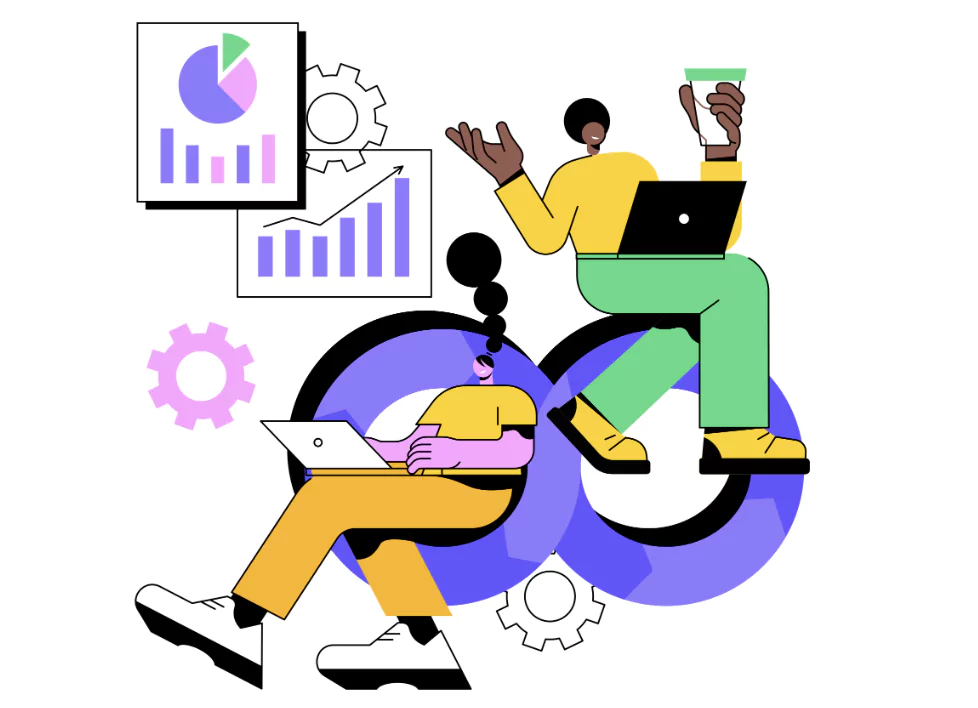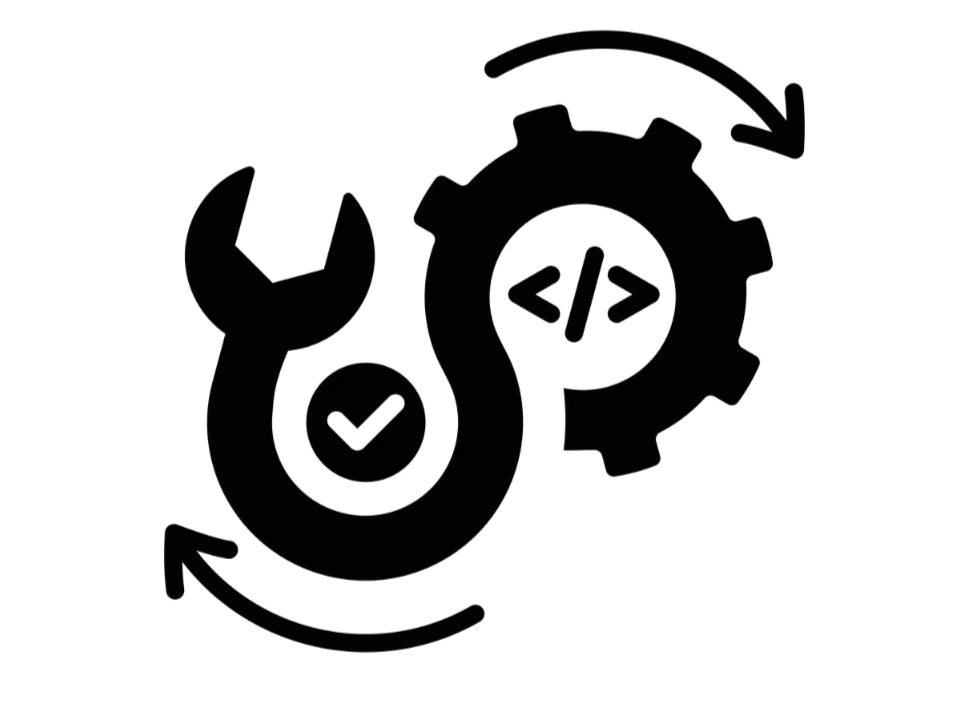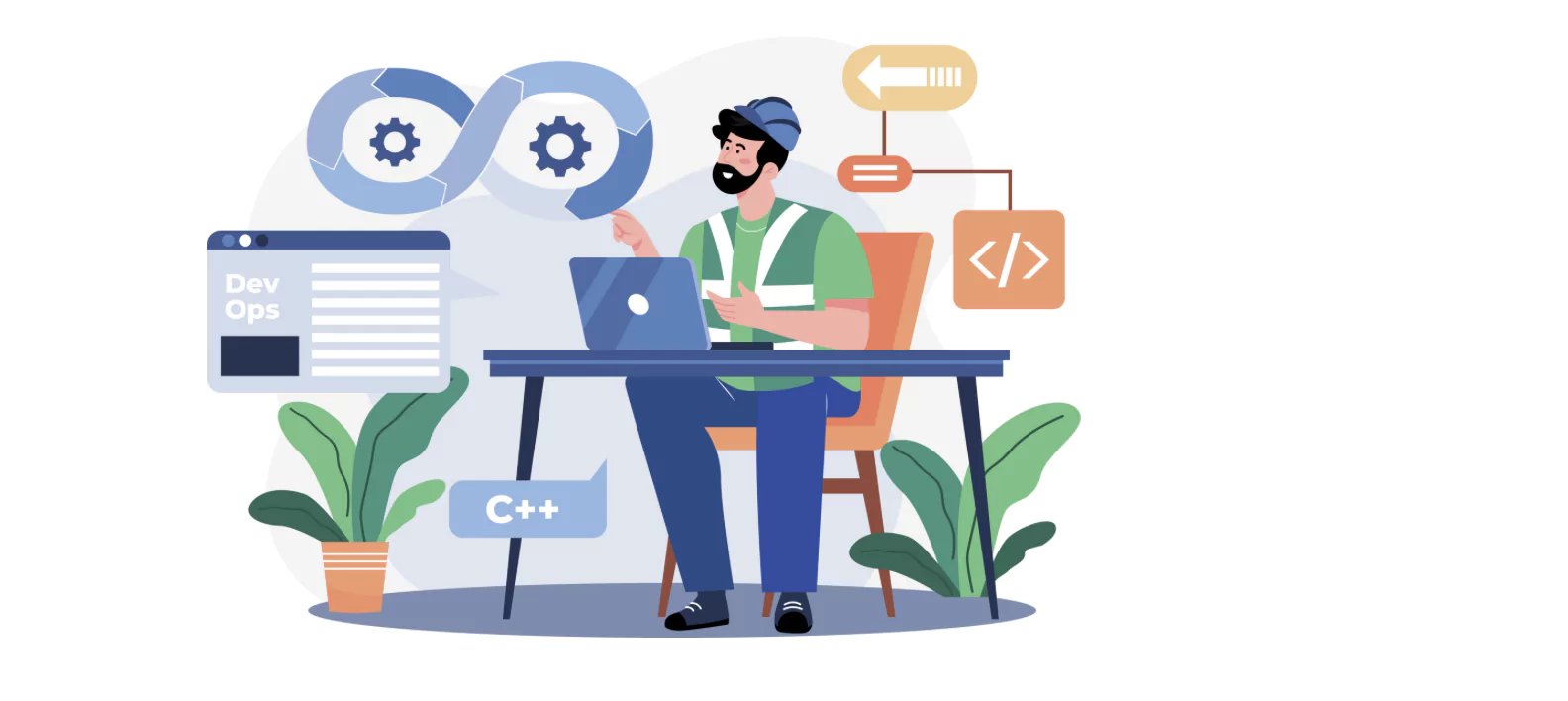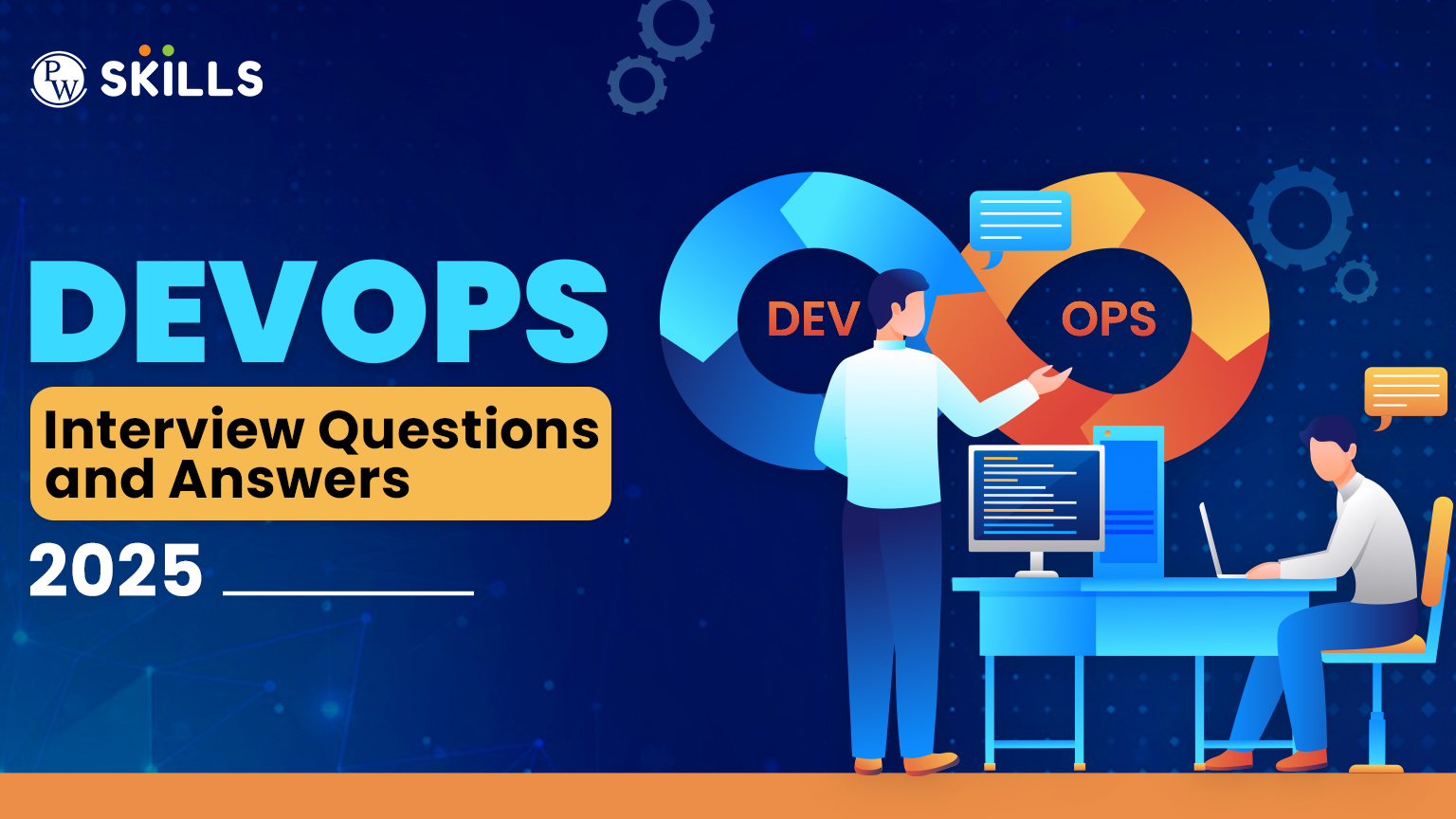Are you looking for a complete set of DevOps interview questions covering all basic questions asked during interviews especially for freshers. DevOps is a rapidly growing branch working based on agile methodologies bridging the gaps and bottlenecks between the operations (IT) and the development team (Dev).
If you want to build your career in DevOps then you must be familiar with the basics of DevOps and its fundamentals on which it works. This blog will take you through some of the most important devOps interview questions with answers.
Is DevOps a Good Start For Freshers?
DevOps is in huge demand since it made software development life cycle more effective. Its integration with cloud computing and automation makes it an in-demand skill for professionals. Even at entry level devOps professionals can easily earn more than a traditional IT support engineer.

As a DevOps engineer freshers can get hands on learning exposure in development, deployment, testing, CI/CD, infrastructure, and monitoring helping you become a complete package by mastering the core engineering skills. You will also be learning in demand tools such as Kuberentes, Jenkins, Cloud platforms and more.

A DevOps engineer does not need to be a master at programming but must be familiar with it along with Linux, networking, shell scripting, Git, and others. DevOps combines development, operations, automation, cloud, scripting and more which can be overwhelming at start but getting familiar with in-demand skills and building a career out of it might be the best choice. Read this blog to get a wide range of DevOps interview questions along with answers for each.
DevOps Interview Questions And Answers For Beginners

Beginners must practice solving devOps interview questions to strengthen their concepts of the basics of devOps along with its tools and framework. Below we have handpicked frequently asked DevOps interview questions and answers.
Q1. What is DevOps?
Ans: DevOps is an agile methodology approach which is used to bridge the gap between development (dev) and IT operations (ops) team. It makes the software development life cycle faster and provides continuous delivery with high quality of the end product.
It focuses on collaboration, automation, and integration with the dev and ops team to build, test and release software faster and in a more reliable manner.
Q2. Why is DevOps important?
Ans: DevOps is an approach which helps organisations deliver software products quickly and in a more reliable manner. It promotes continuous delivery and improvement with better team collaboration, speed, and fixtures of any error or bugs that come midway. DevOps reduces downtime, promotes continuous delivery and improvement based on users feedback. Practice a lot of devOps interview questions along with practice excercises to learn devOps and pass interview easily.
Q3. What are the key principles of DevOps?
Ans: The key principle of DevOps includes collaboration, continuous integration and Continuous delivery (CI/CD), automation, monitoring, and feedback loops. These principles help create a smooth and optimised SDLC pipeline where the entire process becomes smooth and safe based on real time feedback from users.
Q4. What is the difference between Agile and DevOps?
Ans: Agile is a methodologies which works based on iterative and incremental approach with high degree of clients collaboration. It is based on tight feedback loops and continuous improvement in product based on those feedback.
DevOps on other hand is a wider approach very similar to agile methodologies but focuses on automating and streamlining the entire software development life cycle with focus on continuous integration and continuous delivery. DevOps ensures that the entire production is faster and reliable while agile is based on speed and flexibility. It is one of the most frequently asked devOps interview questions.
Q5. What is CI/CD in DevOps?
Ans: CI/CD comprises two important processes i,e. Continuous Integration and Continuous Delivery. Continuous integration means frequently merging changes in code into a shared repository and testing them using automation.
Continuous delivery means to ensure that the code is always present in a deployable state. With CI/CD faster software delivery and significant reduction in error is possible.
Q6. What is version control and why is it important in DevOps?
Ans: Version control systems are used to track changes in code and allow multiple developers to collaborate and make changes/overwrite each other’s work.
In DevOps, version control is crucial for managing code, automating CI/CD pipelines, rollbacks, and more. Version control takes the snapshot which can be recalled later when needed.
Q7. What is Infrastructure as Code (IaC)?
Ans: Infrastructure as Code (IaC) is the practice of managing and provisioning infrastructure through code rather than using the manual processes.
Various tools like Terraform or AWS CloudFormation allow you to write infrastructure configurations that can easily be versioned, tested, and deployed like application code. This approach improves consistency, reduces errors, and enables automation in DevOps workflows.
![]() Join Our Devops & Cloud Computing Telegram Channel
Join Our Devops & Cloud Computing Telegram Channel
![]() Join Our Devops & Cloud Computing WhatsApp Channel
Join Our Devops & Cloud Computing WhatsApp Channel
Q8. What are some commonly used DevOps tools?
Ans: DevOps uses a wide range of tools and frameworks to ensure continuous delivery and integration. There are various tools for containerization, delivery, deployment, integration, automation, and more.
Some of the tools are Git for version control, Jenkins/GitHub Actions for CI/CD, Docker for containerization, Kubernetes for container orchestration, Terraform for IaC, Ansible for configuration management, and Prometheus/Grafana for monitoring. Each tool plays a role in automating and improving different parts of the pipeline.
Q9. What is the role of Docker in DevOps?
Ans: Docker is a popular tool in devOps used in containerization that allow applications to run in isolated environments known as containers. Docker is used to develop, ship and run applications using light weight containers. This approach is very helpful for developers to separate their application from business infrastructure giving them more power to deliver better quality.
Q10. What is Kubernetes and how does it relate to DevOps?
Ans: Kubernetes is a portable and extensible open source application used for automating the deployment, scaling and management of the containerized application in DevOps.
It manages containerized workloads and facilitates automation and configuration. It is especially useful in production environments where managing many containers manually becomes impractical.
Q11. What is continuous monitoring in DevOps?
Ans: Continuous monitoring in DevOps is used to track application performance and users experience in real time using tools like Grafana, Prometheus, Nagios, and more which works by collecting logs and metrics.
In DevOps, this helps teams quickly detect issues, reduce downtime, and continuously improve software based on live system behavior and usage patterns. Practice a lot of devOps interview questions along with practice excercises to learn devOps and pass interview easily.
Q12. What are some benefits of using DevOps?
Ans: DevOps provides a range of benefits especially in the software development life cycle including faster software delivery, improved deployment, frequent collaboration, reduced failure rates, and quick recoveries.
It helps reduce the bottleneck of dev and ops team and maintain higher reliability with more quick response to feedback from users.
Q13. How does automation help in DevOps?
Ans: With automation in DevOps cross team collaboration and automation of repetitive tasks become possible. This complete process reduces chances of error, increases reliability, fastens the software delivery process, monitors user experience in real time, and helps in implementing shorter feedback loops. Smart tools like Jenkins, Ansible, and Terraform make automation possible across the entire DevOps lifecycle. Automation is one of the most important DevOps interview questions.
Q14. What is the typical DevOps lifecycle?
Ans: The devOps lifecycle is very simple and follows the effective process starting from planning to monitor phase. Check the stages involved in devOps lifecycle.
- Plan
- Develop
- Build
- Test
- Release
- Deploy
- Operate
- Monitor
This is a continuous cycle where regular feedback loops are used to improve each stage. DevOps ensures that changes flow smoothly and quickly through each phase, with automation and collaboration driving efficiency.
Q15. Can a non-coder start a career in DevOps?
Ans: A Non-coder can also start a career in devOps especially candidates from non-technical background. If you have strong interest in system administrators, cloud technologies, infrastructure and more in software development then just go for it.
While some scripting or coding knowledge (e.g., Bash or Python) becomes essential over time, many tasks can be learned step-by-step. Starting with Linux, cloud basics, and automation tools is a good entry point.
Popular DevOps Interview Questions For Freshers

Some of the most frequently asked DevOps interview questions are listed below. Make sure you practice these concepts for your next interview.
Q1. What are the key benefits of using DevOps?
Ans: There are a wide range of benefits of using devOps in modern software development practices.
- Faster and better product delivery
- Faster issue resolution and less complexity
- More stable environments
- Better resource utilisation
- High degree automation
- High quality product with continuous feedback loops
- Better collaboration with cross teams
- Effective and optimised process using automation
Q2. What is the meaning of DevOps?
Ans: DevOps stands for Development (Dev) and Operations (ops) acting as a bridge between these two teams ensuring better collaboration, faster delivery, high integration, automation, real time monitoring, and more.
Q3. What is continuous deployment in DevOps?
Ans: Continuous deployment is used to automatically push the changes made in code to the production environment. A series of complete predefined test drives the automation and as soon as new updates are passed the system then pushes the updates directly to the users.
Q4. Give examples of Containerization tools in devOps.
Ans: Kubernetes, Docker, Openshift, Docker Swarm, GitLab, and more are some of the most common and frequently used devOps tools.
Read More: How DevOps Works: Complete Explanation for Beginners
Q5. What is Jenkins in DevOps?
Ans: Jenkins is an open source continuous integration and continuous delivery automation software in devOps tool written in java programming language used for building, testing, and deploying software projects and automating the entire CI/CD pipelines.
Q6. Why is monitoring important in DevOps?
Ans: In DevOps, monitoring is used for real time feedback and performance tracking which can help developers stay updated with the latest performance and issues in application. Some of the tools in devOps used for monitoring are Grafana, Prometheus, ELK stack, and more.
Q7. What are the top programming languages important in DevOps?
Ans: It is important to be familiar with top programming and scripting languages to build a successful career in devOps. Some of the top programming and scripting languages are Golang, Java, Ruby, Bash, Python, Powershell, and more.
Q8. What is the blue/green deployment pattern?
Ans: Blue deployment pattern is used to represent the current live version of the application that users are interacting with in real time. It is the stable version of the application that has already been tested and deployed on the platform.
The green deployment pattern is where the new version of the application is deployed, tested and verified in a production based setting without any effect on live users. If there exists any issue in the environment it can be reversed back to the blue environment easily with minimal downtime.
Q9. What is the difference between Agile and DevOps practice?
Ans: Some of the major differences between Agile and DevOps practice are mentioned in the table below.
| Agile | DevOps |
| Agile is a software development methodology focused on iterative progress. | DevOps is a culture and set of practices focused on automation and collaboration between development and operations. |
| It includes development and testing of software features. | DevOps comprises end to end software delivery including development, deployment, and operations. |
| It delivers small, functional parts of software quickly and frequently. | Deliver software reliably, frequently, and with automation. |
| Agile involves mainly developers and QA testers. | DevOps involves developers, QA, and IT operations together. |
| It iterates delivery in sprints. | It is based on Continuous integration and continuous delivery/deployment (CI/CD). |
| It focuses on feedback after each sprint. | It includes real-time feedback from production and monitoring tools. |
| It is limited to testing and build processes. | It is based on automating spans the entire pipeline – code, test, deploy, monitor. |
| Jira, Trello, Scrum, Kanban. | Jenkins, Docker, Kubernetes, Ansible, Terraform, AWS, Git, etc. |
| Emphasizes agile principles, customer collaboration, and flexibility. | Emphasizes collaboration, automation, and responsibility sharing. |
| Faster development cycles and quicker response to change. | Faster, more reliable deployments with minimal downtime. |
Also Read:
- How DevOps Works? Easy Explanation
- DevOps Career Path: Your Career Guide For 2025
- The 20 Most Important DevOps Trends in 2025: Beat the Game
- DevOps Engineer Salary in India: Fresher to Experienced Effective Pay Scale 5 Step Guide
Prepare for DevOps Interview With PW Skills
Become a master in the art of building your own devOps pipeline with PW Skills DevOps and Cloud Computing Course. Learn the fundamentals of DevOps, best practices and advanced devOps tools through interactive tutorials and industry oriented curriculum. Also, get a wide range of devOps interview questions for practice to help you strengthen your concepts in devOps. Practice a lot of devOps interview questions along with practice excercises to learn devOps and pass interview easily.
Work on real world projects and master the art of continuous delivery of high quality software products only at pwskills.com. Get complete career assistance and prepare for interviews under the guidance of dedicated mentors on our platform. Get your industry recognised certification after successfully completing the course.
DevOps Interview Questions And Answers FAQs
Q1. Is DevOps a good for beginners?
Ans: DevOps is a good career option especially for freshers and entry level positions. DevOps is a broad field which offers a wide range of opportunities with in demand technologies in Cloud computing, automation, artificial intelligence, and more.
Q2. Why is DevOps important?
Ans: DevOps is an approach which helps organisations deliver software products quickly and in a more reliable manner. It promotes continuous delivery and improvement with better team collaboration, speed, and fixtures of any error or bugs that come midway.
Q3. Is learning devOps easy or hard?
Ans: DevOps is a broad field with a lot of concepts to master, however if you start under good guidance with discipline you can easily learn devOps. Start by learning a few of the easy skills and work on some projects to keep expanding your knowledge in devOps.
Q4. Does DevOps need coding?
Ans: DevOps require a little bit of coding i,e. You must be familiar with programming and scripting languages for devOps but need not to be master at it.


